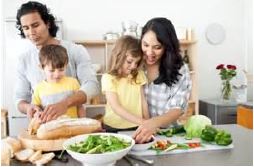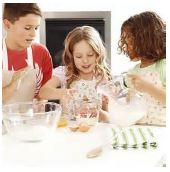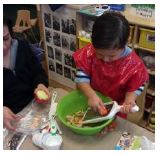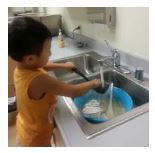Cooking With Young Children
Cooking with children can be considered a fun learning activity for both young children and their parents. Cooking is one of a few activities that can improve many abilities at once. Children can enhance math, science, language, motor development, art and social skills through cooking. Children especially enjoy learning with their parents. Cooking as a family helps parents learn to serve healthy nutritious meals, fosters positive parent-child interactions, and improves the style in which the children are fed. This in turn, translates into raising children who are nutritionally and developmentally healthy (Spears, 2000). When children learn healthy eating habits at an early age, they will continue to use these habits throughout their lives (Clark, Goyder, Bissell, Blank, & Peters, 2007). Involving young children in planned cooking experiences is a great way to teach them about good eating habits (Dodge & Colker, 1996). Finally, cooking helps picky eaters feel some ownership and pride in the new foods they prepare. This increases the likelihood that they will try (and like) a greater variety of foods.

What Children Can Learn From Cooking
Cooking is not only a fun activity for children, but helps children develop school readiness skills. These skills include:
- Math: Following recipes teaches counting, measuring, sequencing, sorting and fractions. Working with food teaches shapes and colors.
- Reading: Cookbooks and recipes teach print awareness through cooking and reading recipe books, and use of cooking terms builds vocabulary.
- Science: Cooking provides opportunities to learn about food groups and how food grows, observe how food changes while cooking and use the five senses.
- Creative art: Creating and decorating foods can be a creative process.
- Cultures/History: Cooking provides opportunities to experience other cultures by preparing foods from other countries.
- Nutrition/Health: Proper food handling teaches food safety and hand washing. Cooking can be used to introduce nutrition concepts, healthy cooking methods and healthy ingredient use.
- Social skills: Cooking together uncovers the importance of being responsible, working together, sharing, completing a task and feeling confident.
- Physical development: Preparing food develops fine motor skills through cracking eggs, chopping, stirring, pouring and cutting.

Young Children’s Cooking Skills
2-year-olds can:
- Scrub fruits and vegetables
- Carry unbreakable items to the table
- Dip foods
- Wash and tear lettuce and salad greens
- Break bread into pieces
3-year-olds can:
- Pour liquids into the batter
- Mix batter or other dry and wet ingredients together
- Shake liquid in a closed container
- Spread butter or soft spreads
- Knead dough
- Wash fruits and vegetables
- Serve foods
- Put things in the trash during cooking and after a meal
4- and 5-year-olds can:
- Juice oranges, lemons and limes
- Peel some fruits and vegetables
- Mash soft fruits and vegetables
- Cut soft foods with a plastic knife
- Press cookie cutters
- Measure dry ingredients
- Crack open/break eggs
- Beat eggs with an eggbeater
- Set the table
- Wipe up after cooking
- Clear the table after a meal

How to Cook With Young Children
- Begin by washing hands thoroughly for at least 20 seconds.
- Provide constant supervision.
- Have children stand at the level of the activity. Use a stool or chair if necessary.
- Use cooking supplies that will not break.
- Use plastic, butter or dull knives for cutting.
- Discuss kitchen rules before cooking and repeat them whenever necessary.
- Read the recipe with your child. Explain that you will be following the steps in the recipe to prepare the food.
- Provide simple directions one at a time.
- Be patient with children’s cooking efforts. Expect spills and messes.
- Encourage children to try age-appropriate cooking steps without your help.
- Include children in the clean-up process.


Introducing Little Books and Little Cooks Program
University of Nevada Cooperative Extension is currently providing a seven-week interdisciplinary parenting education program for preschool-age children and their parents. It incorporates both parenting and nutrition education. The program, called Little Books and Little Cooks, is designed to help parents make cooking safe, fun and easy. Each recipe in the program is kid-friendly, healthy and uses cooking utensils safe for children.

References
- Clark, H. R., Goyder, P., Bissell, P., Blank, L., & Peters, J. (2007). How do parents’ child-feeding behaviors influence child weight? Implications for childhood obesity policy. Journal of Public Health, 29(2), 132-141.
- Dodge, D. T., & Colker, L. J. (1996). The creative curriculum for early childhood. Washington: Teaching Strategies.
- Spears, J. A. (2000). Cooking with kids, Texas Child Care, 24(2), 24-31.
Kim, Y.
2015,
Cooking With Young Children,
University of Nevada Cooperative Extension, Fact Sheet-15-03


